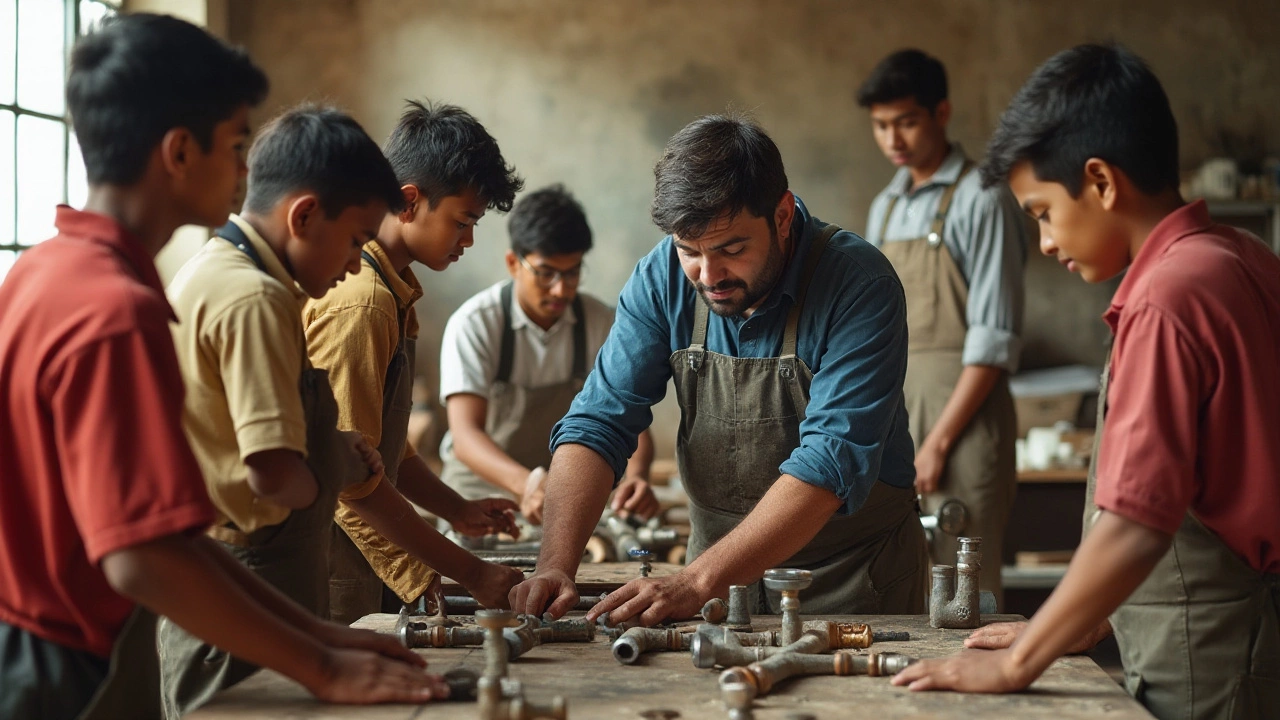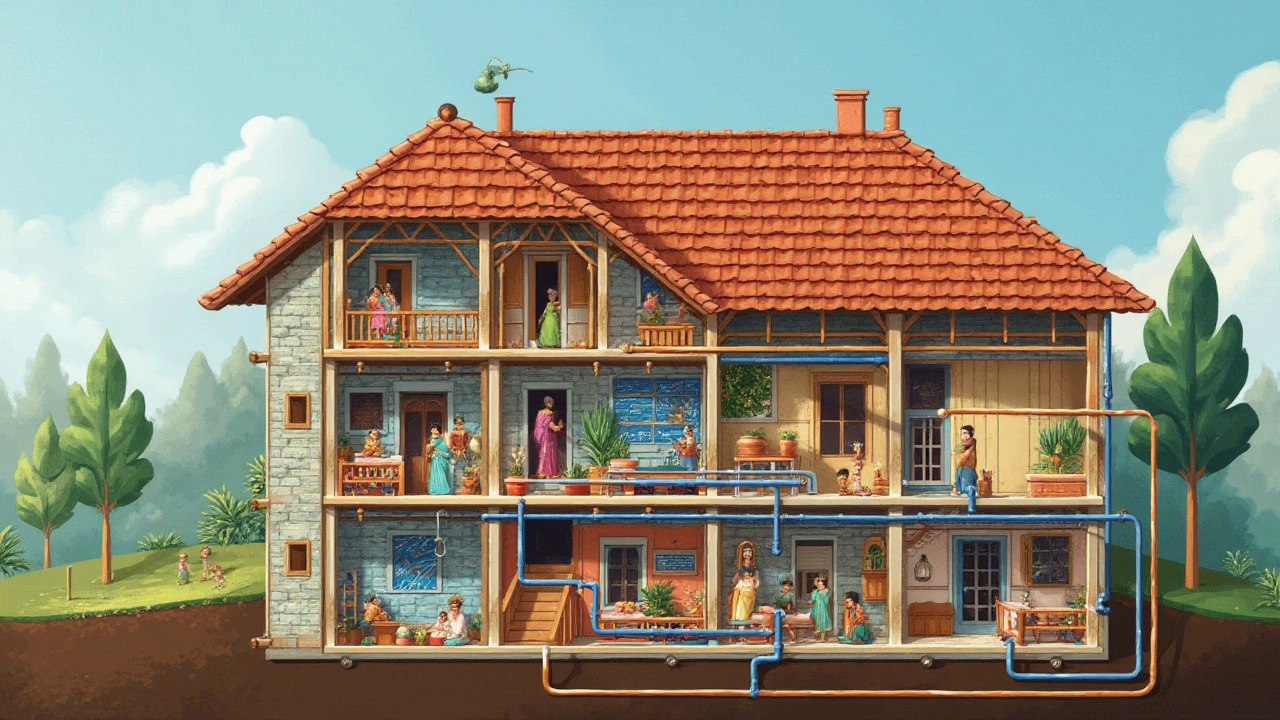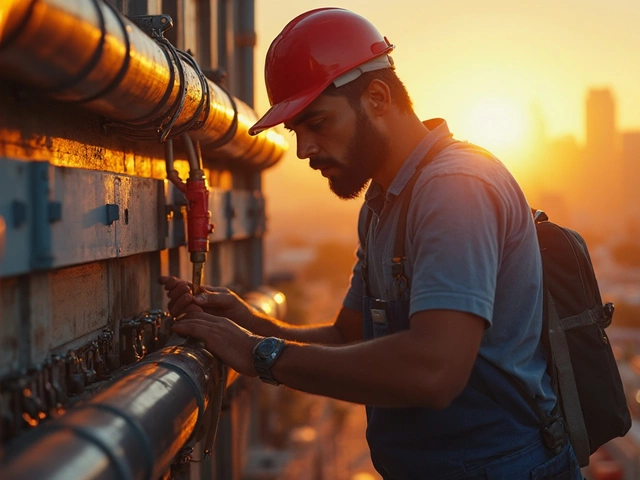In the bustling world of construction and maintenance, plumbers hold a critical role in ensuring that the building infrastructures we rely on are fully functional and safe. As plumbing systems become increasingly complex, the demand for skilled labor in this field has only continued to rise, creating an array of job opportunities for seasoned professionals and newcomers alike.
Navigating this expansive career path begins with understanding the most common roles within the plumbing industry. Whether you're fascinated by the idea of installing intricate pipe systems or resolving everyday plumbing issues, this guide will help you uncover where your skills might best fit in this indispensable trade.
- Introduction to Plumbing Careers
- Essential Skills and Training
- Common Roles and Responsibilities
- Career Advancement and Opportunities
Introduction to Plumbing Careers
The world of plumbing is an intricate tapestry woven with a variety of roles and responsibilities. From installing brand-new systems in homes to troubleshooting and fixing existing structures, the life of a plumber involves much more than meets the eye. Despite misconceptions that plumbing is a straightforward career, it in fact requires a deep understanding of water systems, strong technical skills, and a flair for solving complex problems. Many plumbing careers offer the chance to work independently, and at times, this flexibility is a primary reason people are drawn to the trade. Another significant aspect of pursuing a career as a plumber is the satisfaction derived from assisting clients by solving their plumbing issues, a service that’s indispensable in homes and businesses alike.
As buildings continue to expand and modernize, so too do their plumbing requirements. This demands that plumbers continue their education and training beyond initial certifications, ensuring that they’re up-to-date with new technologies such as sustainable water management systems and smart home integrations. An interesting statistic from the Bureau of Labor Statistics shows that employment for plumbers is projected to grow, roughly adding around 20,000 new jobs by 2030—a testament to the consistent demand for skilled workers in this field.
Thomas J. Donohue, a noted industry expert once said, "Plumbers are the lifeline of urban development. Without them, our cities would not just be less comfortable, but practically uninhabitable." These words resonate deeply as, indeed, the work conducted by plumbers directly impacts the quality of life and environmental sustainability for entire communities.
Understanding the impactful nature of this career begins with comprehensive training programs that prepare individuals for the various facets of plumbing work. Apprenticeships, which typically last four to five years, allow novice plumbers to learn directly from experienced mentors. This hands-on approach is invaluable, as it exposes apprentices to real-world challenges and opportunities to apply classroom knowledge. Many plumbing careers start at vocational or technical schools, where students complete coursework in mathematics, blueprint reading, and physics, among others. By the time they are ready to obtain a license, aspiring plumbers should have accrued thousands of hours of practical experience, enabling them to tackle any job site with confidence.

Essential Skills and Training
Embarking on a career as a plumber requires a mix of technical proficiency, hands-on experience, and the pursuit of continuous learning. The journey isn’t solely about mastering the mechanics of plumbing systems; it includes understanding intricate blueprints, adhering to building codes, and troubleshooting complex issues effectively. Those entering this field must first complete a vocational training program that covers the essentials of plumbing—usually lasting a few months to a couple of years, depending on the depth and breadth of the curriculum available. These programs offer foundational knowledge about pipe systems, water heaters, drainage systems, and the regulatory frameworks governing them, which are critical for any aspiring plumber.
One cannot overlook the significance of an apprenticeship program, which is a rite of passage for most individuals stepping into the world of plumbing. These programs are not only about acquiring practical skills. They are pivotal in helping individuals cultivate a professional attitude towards work, emphasizing safety standards, and preparation for unexpected challenges on the job. An apprenticeship typically lasts from two to five years, during which time apprentices work under the tutelage of seasoned plumbing careers, gaining hands-on experience and valuable industry insights. The United States Bureau of Labor Statistics notes that "apprenticeship is one of the key bridges to competency that combines paid on-the-job training with classroom instruction in a range of industries."
For those eager to ascend the ladder within the plumbing industry, obtaining certifications is often beneficial. State and national certifications not only validate a plumber's skills but also increase employability and credibility in the eyes of potential clients or employers. Such credentials often require passing difficult examinations that assess both the theoretical and practical knowledge gained over years of training and work. Keeping abreast of the latest technologies and tools in plumbing is another critical aspect of training, as it ensures that plumbers are equipped to tackle modern challenges efficiently and safely. For instance, proficiency in operating sophisticated tools like hydro-jetting equipment or trenchless pipe installation technology can separate a good plumber from a great one.
"Training and education are vital components that not only enhance skills but empower individuals to set benchmarks in the plumbing industry," asserts the Plumbing-Heating-Cooling Contractors Association (PHCC).
Additionally, soft skills such as communication, problem-solving, and customer service are just as essential in this profession. Plumbers frequently interact with clients, contractors, and other stakeholders, making it imperative to foster rapport and trust through clear and effective communication. Problem-solving skills allow plumbers to identify issues quickly and strategize effective solutions, sometimes under significant time pressure. These aspects of plumbing training are crucial, as they strongly impact both the individual’s career trajectory and overall satisfaction of the clients served.

Common Roles and Responsibilities
Stepping into the world of plumbing ushers you into a field teeming with diverse roles and responsibilities that are both challenging and rewarding. At the heart of every successful plumbing career is the multifaceted role of the plumber—the pivotal figure responsible for installing, maintaining, and repairing pipe systems in residential, commercial, and industrial settings. Each day on the job might look different, yet every task remains crucial in upholding the safety and functionality of the built environment. The plumber jobs not only involve working with water systems, drainage, and gas lines but also demand a keen problem-solving ability to diagnose and rectify complex issues efficiently. It's like solving a constantly changing puzzle where each piece needs precise fitting to ensure the whole picture stays intact.
One of the primary roles a plumber might step into is the service or repair plumber, who predominantly tackles everyday plumbing malfunctions—think leaky faucets, clogged drains, or broken toilets. This role requires the expertise to quickly assess situations and implement effective solutions, ensuring minimal disruption to the client’s routine. Service plumbers are often the face of the plumbing profession that people know, arriving promptly to address unexpected challenges in homes and businesses alike. Yet beyond these visible tasks, they also advise customers on the maintenance and efficient operation of their systems, playing an educational role that goes unnoticed.
Then there are the installation experts, the silent warriors behind the scenes in every construction project. These plumbing careers come into play from the ground up, reading blueprints and planning the layout of pipes, fixtures, and appliances such as water heaters and dishwashers. They work closely with architects and engineers to ensure that plumbing systems integrate seamlessly into the overall design, blending utility with aesthetics. This is where the technical acumen and detailed precision of a trained plumber truly shine—ensuring systems are not only functional but efficient and compliant with stringent building codes. They might work on various scales, from individual home installations to complex industrial sites, each presenting its unique set of challenges and learning opportunities.
Some professionals might find their niche as specialists in a particular domain, such as pipefitters or steamfitters, who focus more on installing and maintaining pipes that carry acids, chemicals, and gasses. Their skill set is essential in manufacturing, power generation, and large-scale industrial environments, where safety is paramount, and precision is non-negotiable. These professionals often receive specialized training and certification to handle the hazardous materials they encounter, elevating their plumber training beyond standard procedures. They serve as a testament to the critical role plumbers play beyond what meets the eye, ensuring that critical infrastructure operates smoothly under intense conditions.
An interesting narrative in plumbing history comes from John C. Leech, a renowned figure in plumbing education, who once said,
"Understanding the labyrinth of pipes beneath our floors is akin to mastering the veins of a living organism, each playing an indispensable role in the health of the system."His insight provides a backdrop to the comprehensive nature of plumbing roles, highlighting how they weave into every aspect of modern society, right from the water we drink to the air we breathe.
Plumbing industry innovations and technological advancements continue to redefine roles, prompting plumbers to adapt to features like smart sensors or environmentally conscious solutions such as greywater recycling systems. Those willing to embrace new technology and broaden their skill set find themselves with myriad opportunities for career advancement. As we edge towards greener living, the demand for eco-focused plumbers who can install solar panels or design sustainable water systems is increasing, hinting at a promising future for forward-thinking professionals.
To sum it up, whether it is solving immediate problems, contributing to the shaping of infrastructures, embracing niche specialties, or innovating for sustainability, common plumber jobs are diverse and dynamic. No two paths are the same; each holds potential for growth and significance. This journey isn't just about fixing pipes or stopping leaks; it’s about constructing an invisible network that supports our daily lives, striving for improvement and efficiency in every scenario.

Career Advancement and Opportunities
For plumbing professionals, exploring avenues for career advancement is crucial to not only staying competitive but also achieving personal growth. From taking on more complex roles to venturing into specialties, there are numerous paths one can follow to elevate their expertise and standing in the industry. Many start as apprentices, dedicating time to learn the ropes under seasoned plumbers, gaining a foundation for future success. This apprenticeship period is a crucial stepping stone, offering immersive experience which is often accentuated by vocational training, aligning with industry standards and requirements.
Aspiring plumbers may choose to specialize, amplifying their proficiency in niche areas of the plumbing trade. Some may opt to focus on plumbing careers centered in residential services, installing and repairing home systems such as water heaters, fixtures, and drainage systems. Others might pivot towards commercial plumbing, dealing with extensive piping systems and the intricacies *beneath* skyscrapers and factories. The specialization route can significantly expand working portfolios, allowing individuals to command higher pay and recognition for their targeted skills.
Obtaining certifications and licenses plays a pivotal role in career development within plumbing professions. The licensing process varies by region but generally requires rigorous testing to validate the proficiency and competence of a plumber. Certifications, often catered by professional bodies, serve to both refine and prove one’s expertise in specific plumbing systems or methodologies. With each credential, the doors to prominent roles widen, encompassing supervisory or consultant positions. A step further is earning a Master Plumber designation, the pinnacle of professional recognition, often associated with substantial experience, profound expertise, and a commitment to the craft.
Another intriguing facet of plumber jobs is the entrepreneurial route. Many seasoned plumbers leverage their extensive field experience to establish their own plumbing businesses. While managing a company presents its own set of challenges, it allows for autonomy and the possibility to nurture a personal brand. Successful plumbing business owners often highlight the importance of building a reliable team, managing client relationships effectively, and staying ahead through continuous learning within the rapidly evolving plumbing industry.
In a recent discussion on the evolving landscape of plumbing, John Hager, a renowned industry leader, eloquently stated,
"The demand for skilled plumbers is robust, but it is those equipped with specialized knowledge and a drive for innovation who will truly define the future of our trade."According to a comprehensive report by the Bureau of Labor Statistics, the job growth for plumbers, pipefitters, and steamfitters is projected to grow 4% from 2022 to 2032, suggesting a steady demand and ample opportunities for career progression. This indicates a welcoming environment for those seeking to carve out a niche or lead in the plumbing industry’s evolution.





Write a comment